#konstantin lazarev
Text
LAZAREVIC SISTERS V
Olivera Lazarevic
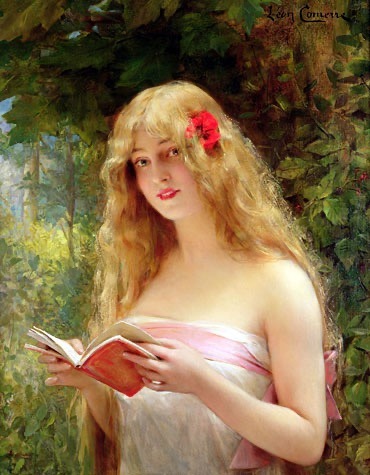
Early Life
Olivera Lazarević, also often referred to in Byzantine and Greek sources as Maria, was the fifth child and youngest daughter of Knez Lazar and his wife Milica.
She was likely born around 1372/1373 and raised in her father’s capital, Kruševac, receiving the same education as her elder sisters, under the guidance of their mother and maternal aunt, Nun Jefimija.
Like most in her family, she was a fanatic of the arts and literature. Though she was never an artist in her own right, she acted as a patron of it.
There is a folk legend that in her youth, Olivera caught the attention of the Serbian knight, Miloš Obilić, who happened to be a frequent visitor at her father’s court and was considered one of the family.
This attraction led to a marriage proposal by Obilić, yet he was refused by her father, using her young age as an excuse.
Marriage to Sultan Bayezid I
Following the Battle of Kosovo in the summer of 1389, and the death of Sultan Murad I and execution of Knez Lazar, the Serbs abided themselves in a vassalage to the Ottomans due to the Hungarian attacks, who wanted to take charge of Serbia and the advancement of the Ottomans.
To officialize this "ending" vendetta, a proposal was made to the then regent, Milica, of a union of peace with the newly crowned Sultan Bayezid, son of Sultan Murad. Although the mother tried to fight and prolong her final decision, by the end of that same year, her youngest daughter was betrothed to the new Sultan.
The Serbian lords, who were quite unhappy about this betrothal, involved themselves in some sort of intrigues to make Bayezid suspicious in order to prevent this union. However, it obviously did not prevail.
It is unclear if the wedding reception took place in late 1389 or in the spring of 1390. As stated by Konstantin Kostenecki in his biography of Stefan Lazarević written in 1431, he reports that after the Ottoman ambassadors and Milica agreed on the marriage, Stefan appeared before Bayezid with his sister Olivera and the marriage took place. As far as we know, the proposal was accepted in late 1389.
Nonetheless, one thing is for sure, and that is the fact that the reception took place no later than the spring of 1390. This is because the joint action of the Serbs and Turks against the Hungarians in northern Serbia, southern Hungary, and eastern Bosnia took place already in the spring or at the latest in the summer of that year, meaning by the spring of 1390, Olivera was married to the same man who gave orders for her father’s execution.
The wedding seems to have been kept quiet as it appears to have taken place in a mosque, following a Muslim ceremony. Many Serbian lords and people were unhappy about their Orthodox Christian Princess marrying a Muslim, even if it brought some temporary peace to Serbia.
According to Ducas, a 15th-century historian, on top of many talents of silver from Serbia's mines, Bayezid received "a tender virgin."
With this marriage came a new title and epithet. Ottomans referred to her as "Devlet Hatun," meaning "State Woman" or "Queen," while she also earned a Greek nickname/epithet, "Despina," meaning female despot, queen, or mistress.
It appears that for the rest of her life, she was referred to by this epithet instead of her actual name.
A Woman of Great Influence
Despite the unfavorable circumstances in which this political marriage began, it is noted by historical and contemporary historians that Bayezid loved and valued the counsel of his wife, Despina. It is accepted that the couple welcomed three daughters together; the eldest bears an unknown name, the second in line is Pasa Melek, and the youngest is Oruz.
Her legendary beauty, noble background, and education played a key role in Bayezid’s favoritism of her over all his other consorts and in his trust in her counsel.
From the moment she arrived until his last breath, she remained his main and favorite wife, and had influence on her husband's politics, which played in favor of her people.
Despina was, of course, blamed for having introduced European customs, wine, and mass partying into the once "pious" Ottoman court, and for "whispering in her brother’s favor." However, these criticisms were mostly due to the fact that she was a Christian wife and remained one even though she had influence over her husband. This of course, played a role in the Muslim Ottomans distain of her.
Though it is unknown if Despina reciprocated the same sentiment towards her husband, it is noted that wherever Bayezid went, he could not sperate from the Serbian Princess, and thus he took her everywhere with him, suggesting that throughout their marriage she remained a loyal companion.
Throughout his reign, and despite coming and going concubines, Bayezid remained devoted to one woman: Despina.
According to Serbian sources, her biggest accomplishments were to partake in Bayezid’s decision to transfer a vast portion of Vuk Branković’s lands (her brother-in-law through Mara) in 1397, following the man’s death and place them under the governance of her younger brother, Stefan.
The other was to save her brother from Bayezid’s wrath in 1398 when he was accused of conspiring with the King of Hungary. Stefan came to the Sultan after the failed attempt of his mother to defend him. It is believed that Olivera was the one who stepped up, and her brother was forgiven upon admitting his fault.
Captivity
Following the aftermath of the Battle of Ankara in 1402, a battle which Bayezid and his sons, Mustafa and Musa, lost and were taken as captives, Timur sent his generals to plunder Bursa, taking many treasures from the palace with them, including Bayezid's concubines. Eventually, they made their way to Yenisehir, where Despina was hiding with two of her daughters.
Despina and her household were brought to Timur and later to Bayezid, who was being kept captive in a tent. Although they were treated with respect at first, events occurred that led to Bayezid being humiliated and kept in an iron cage, while his wife was forced to perform menial tasks at festivities.
Unable to bear the insult made towards his wife, Bayezid committed suicide in his iron cage and was temporarily buried in Akşehir, where he had passed.
Timur is believed to have felt great guilt because of this and released Bayezid’s entourage. He married Despina’s daughters to the son of one of his generals and the other to his grandson, Ebu Bakr Mirza. Both daughters moved to Samarkand where they lived with their families.
In 1404, Despina was released along with her step-son, Musa, during the transfer of Bayezid’s body to his personal mosque in Bursa. It is assumed she attended his second funeral.
As the Advisor of the Despots
Following her release, nothing is known or recorded about Despina's whereabouts until the 1420s. It is believed by some that she might have stayed in Bursa or somewhere nearby with her youngest daughter until she grew tired of the battle for the throne going on between Bayezid’s sons and later moved to Serbia.
Or, she might have stayed until the time her youngest daughter was married off.
After her return to Serbia, she took her place at her already widowed brother's side as his comforter and trusted advisor. However, she never lived at court but instead had her own residence in the courtyard of Belgrade.
She was extremely popular, respected, and valued in her homeland. Even during her lifetime, the Serbs referred to her as “Esther” due to her sacrificial marriage to a persecutor of the Christians.
During her stay in Dubrovnik, it is plausible she met with her sister and brother-in-law, Sandalj Hranic, though some historians believe she was there for diplomatic reasons, possibly to acquire information on her brother-in-law to inform her younger brother; the now Despot Stefan Lazarevic.
In 1427, her younger brother passed away, but this did not end her influence. Soon after, she acted as an advisor to her nephew, Durad Brankovic, and from 1430 onwards, moved with his family to Smederevo, the new capital.
Murad II, the Ottoman Sultan at the time, must have believed that since Stefan Lazarevic had died without any children to proclaim as heir, then the state should pass from Stefan to his step-grandmother, Olivera, and thus to himself.
As a result of this situation and threat to their state, historians believe it was Despina who planned Mara Brankovic's marriage to Murad in order to prevent the Ottomans from advancing. And thus, the marriage was concluded in 1435 in the Ottoman capital.
Though this marriage, unlike Olivera's own marriage, did not prevent Ottoman expansion in Serbia.
In 1441, while her nephew Durad was in exile, she traveled from Dubrovnik to Bar, where it is believed she was able to convey secret diplomatic letters to her nephew.
Later Life
Nothing is known about the later life of Despina from 1443 onwards; they lost track of her.
The last time she is mentioned alive is in a 1443 document, in which her sister, Jelena, names her as her executor in her will. She left money to Despina in order to build a burial place for her and to distribute some of the money to the poor.
After this, nothing more is recorded; it is unknown when, where, and how she died.
Issue
Unkown Hatun
Pasa Melek Hatun
Oruz/Uruz Hatun
( Sources: Osmanlı Sarayı’nda Bir Sırp Prenses/ Mileva Olivera Lazarevic by Mustafa Çağhan Keskin, КЋЕРИ КНЕЗА ЛАЗАРА ИСТОРИЈСКА СТУДИЈА ПОГОВОР by Jelka Redep, Dve srpske sultanije : Olivera Lazarevic (1373-1444) : Mara Brankovic (1418-1487) by Nikola Giljen, “КЋЕРИ КНЕЗА ЛАЗАРА ИСТОРИЈСКА СТУДИЈА ПОГОВОР” by Jelka Redep, Dve srpske sultanije : Olivera Lazarevic (1373-1444) : Mara Brankovic (1418-1487) by Nikola Giljen, The European Sultanas of the Ottoman Empire by Anna Ivanova Buxton )
#Olivera Lazarevic#olivera despina#despinahatun#lazarevicdynasty#history#art#illustration#lazarevicsisters#ottoman empire#middle ages#hatun#despina hatun#geology#biography
48 notes
·
View notes
Text

I was tagged by the wonderful @kittiofdoom @baldurrs and @jinfromyarikawa to do this 'I have a crush on this character' template. Thank you! 💜
Tagging @playstationmademe @nightwingshero @detectivelokis @sstewyhosseini @leviiackrman @chuckhansen @corvosattano @r6shippingdelivery @chazz-anova @teamhawkeye @nightbloodraelle @voidika @phillipsgraves and anyone else that wants to do it!!
Below the cut is are the names of the characters and the blank template.
Because they are interesting:
James Flint (Black Sails)
Jesse Rentier (Evil West)
Sir Galahad/Grayson (The Order 1886)
Because they're cute:
Sihtric (The Last Kingdom)
Ronon O'Connor (Murdered: Soul Suspect)
Because they are physically attractive:
Max (Black Sails)
Lord Ba'al (Stargate SG-1)
Rachael Dalton (Strike Back)
Because they are my type of men/women:
Alexsandr "Tachanka" Senaviev (Rainbow Six: Siege)
Chloe Frazer (Uncharted)
Because i feel they are the same as me:
Simon "Ghost" Riley (OG MW2) we don't talk about reboot Ghost here 🤢
Corporal Dunn (Call of Duty: Modern Warfare 2)
Because I can:
Zoran Lazarevic (Uncharted 2)
Konstantin (Rise of the Tomb Raider)
Charles Vane (Black Sails)

#Jess the homeboys are back😅#btw i like Max more than just being physically attractive#kittiofdoom#baldurrs#jinfromyarikawa
27 notes
·
View notes
Photo





Lebedev PL-15 Handgun - Konstantin Lazarev (x)
#lebedev#pl-15#lebedev pl-15#handgun#russia#RU#konstantin#Konstantin Lazarev#kalashnikov#kalashnikov concern#suppressor#suppressed#Kalashnikov PL-15
840 notes
·
View notes
Text
“...the akıncı of Rumeli, who were dependent for their livelihood on plunder and prisoners from raiding, had been forced to limit their activities under Emir Süleyman on account of the treaties that he had signed with the Christian powers there. While we have seen that raiding had not disappeared entirely during Süleyman’s reign, the akıncı nevertheless had a strong interest in its resumption in earnest, and seem for this reason to have turned against Süleyman and thrown their support behind his brother Musa. As a result, when Musa came to power he had to make good on his promises to these people by adopting an aggressive policy vis-à-vis his Christian neighbors. For his attacks against Byzantium, a further motive was the support that Manuel Palaiologos had provided to Emir Süleyman, as well as the fact that the Byzantines held in their custody a rival contender to the Ottoman throne, Süleyman’s son Orhan.
The common source of Asıkpasazade and the Ottoman Anonymous Chronicles, which reflects the raiders’ point of view, speaks explicitly of a rise in raiding activity during Musa’s reign. According to this tradition, upon his accession to the throne in Rumeli, Musa Çelebi “pursued the opening of new lands,” meaning of course their conquest from the Christians. We are told that he attacked Vidin, which had revolted against Ottoman rule; Pravadi (Provadia) on the Black Sea; and Köprülü (Koprian) in Serbia (Laz-ili). Our source goes on to relate that following those conquests, Musa “commanded raids in every direction so that his lands were filled (with spoils) and became rich.”
As was explained in the beginning of this chapter, Musa’s policies followed well-established Ottoman methods of conquest, which differentiated between vassal states such as Serbia and Byzantium that were to be absorbed into direct Ottoman administration, and borderland regions where the Ottomans made alliances with local lords against their enemies in an effort to gain new vassals and extend their sphere of influence. Thanks to the anonymous chronicle of the Tocco, we know that Musa formed such an alliance with Carlo Tocco of Cephalonia against Tocco’s Albanian enemies. As with Musa’s earlier alliance with Mircea of Wallachia, the new alliance with Carlo Tocco was sealed by Musa’s marriage to Tocco’s illegitimate daughter. Meanwhile, in addition to major attacks against Byzantine and Serbian towns and cities, smaller-scale raids were carried out in Serbia, Albania, and Southern Greece.
In order to place these events in their proper context, it is necessary to turn to the non-Ottoman sources. Several of these make it clear that after assuming power in Edirne, Musa turned his attention against Serbia and Byzantium by planning and carrying out a series of military campaigns and sieges. Symeon of Thessaloniki, who as we have seen presents Musa’s rise to power as the outcome of an invitation by Manuel II, writes that after Musa came to power, he betrayed his oaths and attacked his Christian supporters viciously. The reference to Musa’s betrayed oaths is noteworthy, as it is also echoed in the account of Konstantin the Philosopher.
Let us turn then to the situation in Serbia. As we have seen, Stefan Lazarevic had provided vital support to Musa in his war against Süleyman. But once that war was over, for reasons that are not entirely clear, the two men became enemies. While Chalkokondyles presents Musa’s hostility against Stefan Lazarevic as revenge for Stefan’s abandonment of Musa at the Battle of Kosmidion, Konstantin the Philosopher places the blame for the falling out entirely on Musa. Konstantin states that Stefan Lazarevic sent an ambassador to the new Ottoman ruler to remind him of the promises he had made during the war, and that Musa responded by attempting to arrest that ambassador. Konstantin’s account appears convincing, and he specifies that Stefan sent to Musa the same ambassador who had been sent previously to Timur. According to Konstantin, the purpose of this embassy was to “settle matters pertaining to mutual coexistence” after reminding Musa of Stefan’s crucial role in his struggle against Süleyman. Konstantin adds that after the ambassador escaped from Musa, he stopped in the forest where Vuk Lazarevic had been killed, collected his remains, and brought them with him back to Serbia. Reading Musa’s hostile action against his ambassador as a declaration of war, Stefan then took the offensive by occupying the town of Pirot (Sehirköy). Whichever side was ultimately to blame for the souring of relations between two former allies, Stefan’s occupation of Pirot marked the beginning of a state of war. According to several sources, Musa responded by ravaging the surrounding area, capturing three unnamed towns, and massacring their inhabitants. He also besieged the city of Smederovo, one of Stefan’s northernmost possessions in the Danubian province of Macva.
Shortly after these operations in Serbia, Musa turned his vengeance against Byzantium, the main ally of his late brother and rival Süleyman. Musa invested Thessaloniki, Constantinople, and Selymbria, probably in that order. Doukas informs us that before attacking Constantinople, Musa first captured all the villages along the river Strymon (Struma) with the exception of Zetounion. Around the same time, Ottoman forces were sent to Thessaloniki and began to besiege the city. Symeon suggests that Musa himself was present when the trenches were drawn and the siege machines constructed.
By 12 August 1411, Musa was outside the walls of Constantinople. But by 3 August he had moved to Selymbria. According to Chalkokondyles, Musa attempted to blockade Constantinople by sea, and the Byzantine navy led by Manuel “the bastard son of the Emperor John” was able to defeat him in a naval battle. But the siege continued on land, and Doukas informs us that Musa burnt all the villages in the vicinity of Constantinople, whose inhabitants had been moved by Manuel into the city walls. We are also told that many Byzantines and Turks were killed in sallies outside the city walls, including the son of emperor Manuel II’s interpreter Nicholas Notaras, John, who was captured and executed by Musa. The man’s body was brought into the city, while his severed head was purchased by his father from Musa for a large sum of money.
The occasion for Musa’s attack on Selymbria that had begun by 3 September appears to have been an attempt on Manuel Palaiologos’ part to relieve the imperial city by releasing Süleyman’s son Orhan, thereby creating a diversion. When he had renewed his alliance with the Byzantines in 1409, Süleyman had handed over his son Orhan along with his daughter Fatma Hatun to Manuel Palaiologos as hostages. Some have claimed that Manuel’s release of Orhan was the direct cause of Musa’s attacks on Byzantium, and that the Byzantines made use of the Ottoman pretender immediately upon Musa’s accession in an attempt to prolong the Ottoman civil war after Süleyman’s death. While such a scenario is certainly plausible, there is no evidence to support it, as there is no mention in the sources of the Byzantines releasing Orhan prior to the siege of Selymbria. Had Orhan already been at large in the spring of 1411, it is unlikely that Musa would have had the freedom to undertake his early campaigns in Serbia, which are cited by Symeon and Konstantin the Philosopher as having taken place before Musa turned his attention to Byzantium. In fact, as we will see below when we discuss Orhan’s bid for power, Orhan’s activity reached its height in the winter of 1411–1412.
Konstantin the Philosopher states that when Musa went to the siege of Selymbria, he took with him George Brankovic, whom he attempted to poison along the way. As we have seen, Brankovic had showed allegiance to Emir Süleyman until the end, only submitting to Musa after Süleyman’s death. According to our source, George Brankovic survived Musa’s poisoning by taking an antidote. Meanwhile, Konstantin claims that Brankovic had anticipated a hostile act on the part of Musa, and had begun negotiations for a reconciliation with his uncle Stefan Lazarevic, “for he was afraid that in the end he would be pursued from two sides.” The negotiations were made through the intercession of George’s mother, who was also Stefan’s sister, and were successful. The two Serbian lords would later unite against Musa. In the meantime, George Brankovic had escaped from Musa and taken refuge with the Byzantines in Selymbria, while Musa took revenge on those of George’s men who were unable to follow him into the besieged city. ...the Byzantines eventually sent George Brankovic from Selymbria to Thessaloniki on board a Venetian ship, from where after many adventures he was finally able to join Stefan Lazarevic in Serbia. ´
As has been stated already, according to Konstantin the Philosopher, while Musa was preoccupied with the siege of Selymbria, his beglerbegi Mihal-oglı Mehmed had escaped to Constantinople. When Mihal-oglı reached the city, “taking with him the most select troops,” the Byzantines gave him refuge within its walls and then ferried him to Anatolia, where he entered the service of Mehmed Çelebi. Konstantin mentions that the inhabitants of Constantinople were occupied with the grape harvest, suggesting that the diversion at Selymbria had indeed relieved the siege of the imperial city. This idea is also reflected in the Ottoman Anonymous Chronicles, which describe Musa’s sieges of Constantinople as a series of intermittent raids. From these sources, it would appear that
Musa did not have enough troops to pursue simultaneously multiple large-scale military operations. As for Mihal-oglı Mehmed, Konstantin the Philosopher states that the immediate cause of his desertion was that he had played a part in George Brankovic’s escape to Selymbria, and feared retribution from ´ Musa Çelebi. But Konstantin also suggests that the deeper cause of the uc begi’s apprehension was that Musa perceived his great power and reputation as a threat, and therefore sought to destroy him. Mihaloglı’s defection to Mehmed is also mentioned in the Ahval, but the Ottoman account places it at the Battle of Incegiz, Mehmed’s first military confrontation with Musa. Nevertheless, the two accounts still appear to be referring to the same event. As in Konstantin’s account, according to the Ahval, Mihal-oglı asked Musa for select troops in order to carry out a special attack on the enemy, who is in this case Mehmed rather than Byzantium. However this is not an important difference, since as we will see below Byzantium was Mehmed’s ally at the Battle of Incegiz and the battle was fought very near the city with the participation of Byzantine troops. The difference in the two accounts appears to be at least in part one of perspective: it is natural that Konstantin would seek the cause of such an important event as the defection of Mihal-oglı among the Serbs and other Orthodox Christians (i.e. the Byzantines) from whose point of view he was writing, while the author of the Ahval would look for it among the Ottomans. As has been suggested, it is also possible that Konstantin has confused the defection of Mihal-oglı with that of Çandarlı Ibrahim Pasa. In any case, taken together these two sources lead to the conclusion that Mihal-oglı Mehmed did indeed switch sides in autumn of 1411, and that the Battle of Incegiz (whose date is unknown) probably took place around the same time.
In the meantime, while Musa’s attacks against Byzantium were in full swing, the Republic of Venice finally succeeded in negotiating a treaty with Musa.”
- Dimitris J. Kastritsis, The Sons of Bayezid: Empire Building and Representation in the Ottoman Civil War of 1402–1413. Vol. 38. The Ottoman Empire and its Heritage: Politics, Society and Economy. Leiden: Brill, 2007. pp. 167-171.
#ottoman empire#rumeli#constantinople#byzantium#akinci#ghazi#raiding#frontiers#border crossings#late medieval warfare#ottoman history#ottoman society#ottoman civil war#warrior aristocracy#defections#serbia#thessaloniki#albania#siege warfare#military raid#venice
1 note
·
View note
Text
Eurovision 2004 my top 36 (WOW)

Hello, and welcome to another episode of this ESC top series, and for the first time ever I go to two different dates: May 12 and May 15, 2004, when the 49th edition took place in Istanbul, Turkey, after Sertab Erener’s victory in Riga last year. This year was the first one to have a semifinal round to accommodate the growing number of participating countries, which was of 36 this year. While Denmark, Finland, Lithuania, FYR Macedonia, Switzerland and Monaco returned to the competition, we said hello to Belarus, Albania, Andorra and Serbia & Montenegro. From the semifinal qualified 10 countries added to the 14 automatically qualified countries from 2003. The contest was won by Ukraine and Ruslana with the song Wild Dances, making this their 1st win and they won the year after they debuted. And now, let’s start this kinda long list. Also, this year is the worst one in terms of sound quality, most of the songs sound cheap and there are a lot of mic fails.
1st Place: SERBIA & MONTENEGRO/Zeljko Joksimović & Ad Hoc Orchestra-Lane moje (Real Placing: 2nd-263 points)
At first I was bored of this song, but then I listened to it and I was amazed by how beautiful is this song. His voice is stunning, the music is mesmerizing and wow... I don’t know what else to say, this takes my breath away and my senses fly to another place.
2nd Place: UKRAINE/Ruslana-Wild dances (Real Placing: 1st-280 points)
HELL YEAH THIS SONG!!!! I was, and still I’m obsessed with this song, it’s so energizing, powerful, epic, and makes me feel good, Ruslana is such a perfect singer and what a voice does she has. Of course this is a worthy winner and what a winner! Also when I was playing GTA 4 this song appeared and I was like ASKJFKLDLK and Ruslana was the DJ, and it was one of the best moments of my life.
3rd Place: CYPRUS/Lisa Andreas-Stronger every minute (Real Placing: =5th-170 points)
Again a cute ballad with a very young singer, and I found it very lovely, the lyrics are cute and the music is so wonderful. I’m so moved by this song every time I listen to this. Surely this song deserved so much more than it got.
4th Place: SPAIN/Ramón-Para llenarme de ti (Real Placing: 10th-87 points)
Oh a song with a very salsa touch to it, Ramón’s voice is very good and suits this song perfectly, the music is so catchy and the lyrics are good. AY QUE CANCIÓN TAN BUENA. I love it.
5th Place: SWEDEN/Lena Philipsson-It hurts (Real Placing: =5th-170 points)
LENA <3 I LOVE YOU, the song is so good, her voice is stunning, as always, and she has such a stage presence with this song, and the microphone stand is a nice touch to this one, I like more the Swedish version but this is very good as well. Hurts oh it hurts really hurts in the middle on the night...
6th Place: BELARUS/Aleksandra and Konstantin-My Galileo (Real Placing: =19th SF-10 points)
This song is very good, has a nice feeling to it, I love the music and maybe the problem here is her voice, but anyway I always enjoy this entry so much and the performance is nice for this song, a nice debut for Belarus too.
7th Place: ALBANIA/Anjeza Shahini-The image of you (Real Placing: 7th-106 points)
Another cute song, the music is so good and her voice is stunning, also I’m in love with her and overall this entry makes me feel so happy, the performance is very effective and what a debut for Albania, well done.
8th Place: GERMANY/Max-Can’t wait until tonight (Real Placing: 8th-93 points)
This song is brilliant, the music is so calms and the lyrics are nice, his voice is so perfect and suits this song so well, I always sing along to this one and I love the part in which he sings in Turkish, a nice detail there. Wow... no more words to describe this wonderful song.
9th Place: GREECE/Sakis Rouvas-Shake it (Real Placing: 3rd-252 points)
If you asked me 2 years ago, I would’ve said that this was in my top 3, but later I discovered 8 songs I like more than this one, still Sakis is very hot, the performance is perfect, I enjoy the music and his voice here was a bit shaky but I like it. I’m in love with this men and with the song as well, what was Greece planning for 2005?
10th Place: FRANCE/Jonatan Cerrada-À chaque pas (Real Placing: 15th-40 points)
What a nice song, I enjoy this ballad so much and his voice is perfect and I love the last part because it’s in Spanish. The performance was a bit too much but it captures the essence of this song. What a beautiful song!
11th Place: ANDORRA/Marta Roure-Jugarem a estimar-nos (Real Placing: 18th SF-12 points)
Awwww a song in Catalan <3 and I love this, her voice could’ve been better but still this works, the music is so 2004 and I’m so crazy about it, this is such a wonderful debut and I enjoy this entry so much.
12th Place: MALTA/Julie & Ludwig-On again... off again (Real Placing: =12th-50 points)
I’m crazy about this song, I love their voices and the music is very schlagery but it works for me, the chorus is so catchy and I like the whole atmosphere in this song.
13th Place: TURKEY/Athena-For real (Real Placing: 4th-195 points)
Again this song is so epic and I love it, this has a nice chorus and the verses are very good, this is something I’ve absolutely would’ve heard in 2004, because it’s awesome.
14th Place: BELGIUM/Xandee-1 life (Real Placing: =22nd-7 points)
Why this finished so low in the final? THIS IS WONDERFUL AND EPIC, she sings so well and the music is amazing, I’m amazed by this one and since I heard it I fell in love with this song. Certainly deserved so much more than it got.
15th Place: ISRAEL/David D’Or-Leha’amin (Real Placing: =11th SF-57 points)
OH WHAT A VOICE, the music is very nice and the performance is perfect, I’m in love with this song and he sings like an angel. I’m so amazed by this song, and it deserved the final.
16th Place: ESTONIA/Neiokõsõ-Tii (Real Placing: =11th SF-57 points)
I’m in love with this song because it’s very interesting, the music is hypnotic and they sing quite bad but I enjoy this entry so much, and the language is very interesting. I like their dresses though.
17th Place: CROATIA/Ivan Mikulić-You are the only one (Real Placing: =12th-50 points)
Before Sergey Lazarev, there was Ivan Mikulić, and this song is lovely, even if it reminds me of another song from Mexico, his voice is so good and the music is pretty and enjoyable, but maybe in Croatian this would’ve been so much better.
18th Place: ICELAND/Jónsi-Heaven (Real Placing: 19th-16 points)
This ballad is nice, but maybe he was nervous because his voice sounds a bit bad here, the music is so brilliant and I enjoy the key change at the end of the song. Overall a nice average song.
19th Place: LATVIA/Fomins & Kleins-Dziesma par laimi (Real Placing: 17th SF-23 points)
Oh a song that makes me feel free, and I enjoy the music so much. Also the fact that this the only song that has been in Latvian it’s nice. I enjoy their voices but here the sound ruins everything.
20th Place: UNITED KINGDOM/James Fox-Hold on to our love (Real Placing: 16th-29 points)
This song is great as well, the music is so enjoyable and perfect, his voice is on point and overall this entry is very cute, I’m in love with this one, a nice song for me.
21st Place: IRELAND/Chris Doran-If my world stop turning (Real Placing: =22nd-7 points)
Oh another lovely Irish ballad, the music is so cute and his voice is very good. The chorus is so nice and here he unleashes his voice. This entry is vey nice and yeah, I like it.
22nd Place: FYR MACEDONIA/Toše Proeski-Life (Real Placing: 14th-47 points)
I’m just in love with his voice, it’s so amazing, but this song isn’t good, sounds kinda cheap and doesn’t grace his voice. I love the performance though and his voice makes this better.
23rd Place: NORWAY/Knut Anders Sørum-High (Real Placing: 24th-3 points/last)
Awww HOW THIS FINISHED LAST IN THE FINAL, this song is so cute, the music is so fresh and I love his voice, this song also has a very catchy chorus, this song didn’t deserve last place in the final.
24th Place: PORTUGAL/Sofia Vitória-Foi magia (Real Placing: 15th SF-38 points)
This song is very good, the music is so catchy and I remember the chorus because it’s memorable, her dress is awful and maybe the performance was poor but I love this song. Her voice is so nice to listen.
25th Place: MONACO/Maryon-Notre planète (Real Placing: =19th SF-10 points)
Oh this is such an adorable song, her voice is very good and I enjoy the music because it’s very good, this was very underrated and this was the comeback of Monaco, with a song that IMO deserved more.
26th Place: DENMARK/Tomas Thordarson-Shame on you (Real Placing: 13th SF-56 points)
This song is enjoyable and nice, he has a nice voice but maybe the performance was too red and too bad, overall this song is good but I need more oomph to this one.
27th Place: FINLAND/Jari Sillanpää-Takes 2 to tango (Real Placing: 14th SF-51 points)
I like the tango sounds on this song, his voice is good and the music is enjoyable and catchy, but I think this song needed a bit more to reach the perfection, also, Jari is such a charming singer.
28th Place: BOSNIA & HERZEGOVINA/Deen-In the disco (Real Placing: 9th-91 points)
This reminds me of Hot Stuff from Donna Summer, and it works a bit for me, I like this one but I think there are better songs this year. I always dance to this one but maybe it’s a bit crazy for me, even I usually like this kind of songs.
29th Place: AUSTRIA/Tie Break-Du bist (Real Placing: 21st-9 points)
Another cute song, but sadly this fails to impress me and it’s kinda boring, the chorus kinda saves this one but this doesn’t go anywhere, they sing okay. Not a great effort.
30th Place: ROMANIA/Sanda-I admit (Real Placing: 18th-18 points)
I must admit that I love the music because it has potential, but her voice was a bit bad and the performance isn’t great, the dress is horrible and they killed their own song, sadly.
31st Place: THE NETHERLANDS/Re-Union-Without you (Real Placing: 20th-11 points)
This is lovely, but I must say that this song after it ends I don’t remember it, the atmosphere is cute but maybe this didn’t stood out in a quite strong final, also the running order killed it.
32nd Place: POLAND/Blue Café-Love song (Real Placing: 17th-27 points)
This song isn’t so bad but I don’t like her voice, is so weird because I usually like those voices. The music is good but sadly this song passes by and doesn’t say anything to me.
33rd Place: LITHUANIA/Linas and Simona-What’s happened to our love? (Real Placing: 16th SF-26 points)
Okay this song is also very annoying, this only repeats the chorus and it turns boring, the music is kinda nice but sadly this song doesn’t goes anywhere.
34th Place: RUSSIA/Julia Savicheva-Believe me (Real Placing: 11th-67 points)
This song is incredibly boring for me, it’s uninteresting, the performance is horrible, what’s going on with those dances, her voice isn’t good, this song is one of the worst Russia has sent to the contest.
35th Place: SLOVENIA/Platin-Stay forever (Real Placing: 21st SF-5 points)
Another boring and plain song, I’m not so fond of her voice and the music is very flat, not a brilliant effort.
36th Place: SWITZERLAND/Piero Esteriore & The MusicStars-Celebrate (Real Placing: 22nd SF-0 points/last)
No... just no Switzerland... this is one of the worst songs I’ve ever heard, no more comments.
1 note
·
View note
Photo

Konstantin Kostenechki
The great religious writers Grigorii Tsamblak, Konstantin Kostenechki, Cyprian and others developed under the direct influence of Patriarch Evtimi. After the Ottomans invaded Bulgaria they continued their useful activities abroad. Grigorii Tsamblak was elected bishop of Kiev and Cyprian became Metropolitan of Moscow. Konstantin Kostenechki emigrated to neighbouring Serbia where he wrote, among many other things, a biography of the Serbian King Stefan Lazarevic,
Parallel with the official literature, as at the time of the ‘Golden Age’, a rich apocryphal literature developed, written by unknown authors from among the people. The apocryphal works can be divided into two large groups – one dealing with economic and everyday life, and another one dealing with the eternal questions of the origin of the world and man. The most famous apocryphal works which have survived from the second group are ‘The Vision of Isaiah’, ‘Enoch’ and the ‘Sermon of the Three . Saints’.
The spirit of the Renaissance
The spirit of the Renaissance was felt not onLy in the apocryphal works and in some of the woiks of Patriarch Evtimi, but also in a considerable number of translated literary works on secular topics, such as. ‘The Fable of Troy’, ‘The Alexandria’ (about the life and exploits of Alexander the Great), ‘Physiologist’ (descriptions of various plants, animals and minerals), historical chronicles by the Byzantine authors George Hamartol (9th century), Zonara (12th century), Konstantin Manasses (12th cen-tury), local variants of pre-biblical legends, etc.
The remarkable upsurge of Bulgarian art and literature during the second half of the 14th century placed Bulgaria in the front ranks of the countries which were headed for the new times. This promising upsurge was, however, crudely nipped in the bud by an external factor – the last barbarian wave which flooded the European South-east in the 14th and 15th century – the onslaught of the Ottomans.
0 notes
Photo
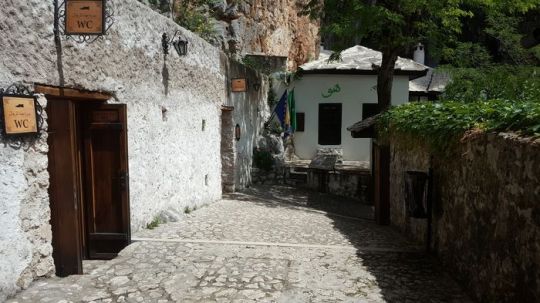
Konstantin Kostenechki
The great religious writers Grigorii Tsamblak, Konstantin Kostenechki, Cyprian and others developed under the direct influence of Patriarch Evtimi. After the Ottomans invaded Bulgaria they continued their useful activities abroad. Grigorii Tsamblak was elected bishop of Kiev and Cyprian became Metropolitan of Moscow. Konstantin Kostenechki emigrated to neighbouring Serbia where he wrote, among many other things, a biography of the Serbian King Stefan Lazarevic,
Parallel with the official literature, as at the time of the ‘Golden Age’, a rich apocryphal literature developed, written by unknown authors from among the people. The apocryphal works can be divided into two large groups – one dealing with economic and everyday life, and another one dealing with the eternal questions of the origin of the world and man. The most famous apocryphal works which have survived from the second group are ‘The Vision of Isaiah’, ‘Enoch’ and the ‘Sermon of the Three . Saints’.
The spirit of the Renaissance
The spirit of the Renaissance was felt not onLy in the apocryphal works and in some of the woiks of Patriarch Evtimi, but also in a considerable number of translated literary works on secular topics, such as. ‘The Fable of Troy’, ‘The Alexandria’ (about the life and exploits of Alexander the Great), ‘Physiologist’ (descriptions of various plants, animals and minerals), historical chronicles by the Byzantine authors George Hamartol (9th century), Zonara (12th century), Konstantin Manasses (12th cen-tury), local variants of pre-biblical legends, etc.
The remarkable upsurge of Bulgarian art and literature during the second half of the 14th century placed Bulgaria in the front ranks of the countries which were headed for the new times. This promising upsurge was, however, crudely nipped in the bud by an external factor – the last barbarian wave which flooded the European South-east in the 14th and 15th century – the onslaught of the Ottomans.
0 notes
Photo
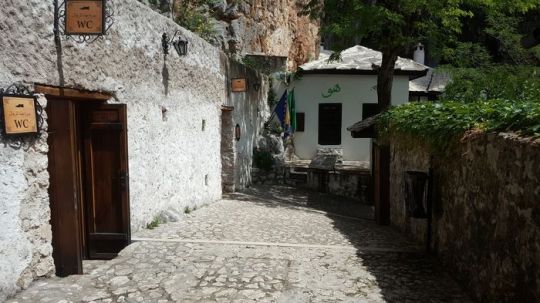
Konstantin Kostenechki
The great religious writers Grigorii Tsamblak, Konstantin Kostenechki, Cyprian and others developed under the direct influence of Patriarch Evtimi. After the Ottomans invaded Bulgaria they continued their useful activities abroad. Grigorii Tsamblak was elected bishop of Kiev and Cyprian became Metropolitan of Moscow. Konstantin Kostenechki emigrated to neighbouring Serbia where he wrote, among many other things, a biography of the Serbian King Stefan Lazarevic,
Parallel with the official literature, as at the time of the ‘Golden Age’, a rich apocryphal literature developed, written by unknown authors from among the people. The apocryphal works can be divided into two large groups – one dealing with economic and everyday life, and another one dealing with the eternal questions of the origin of the world and man. The most famous apocryphal works which have survived from the second group are ‘The Vision of Isaiah’, ‘Enoch’ and the ‘Sermon of the Three . Saints’.
The spirit of the Renaissance
The spirit of the Renaissance was felt not onLy in the apocryphal works and in some of the woiks of Patriarch Evtimi, but also in a considerable number of translated literary works on secular topics, such as. ‘The Fable of Troy’, ‘The Alexandria’ (about the life and exploits of Alexander the Great), ‘Physiologist’ (descriptions of various plants, animals and minerals), historical chronicles by the Byzantine authors George Hamartol (9th century), Zonara (12th century), Konstantin Manasses (12th cen-tury), local variants of pre-biblical legends, etc.
The remarkable upsurge of Bulgarian art and literature during the second half of the 14th century placed Bulgaria in the front ranks of the countries which were headed for the new times. This promising upsurge was, however, crudely nipped in the bud by an external factor – the last barbarian wave which flooded the European South-east in the 14th and 15th century – the onslaught of the Ottomans.
0 notes
Photo
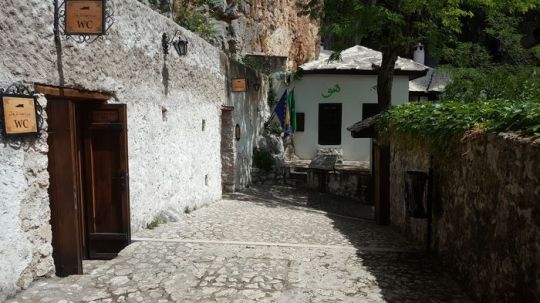
Konstantin Kostenechki
The great religious writers Grigorii Tsamblak, Konstantin Kostenechki, Cyprian and others developed under the direct influence of Patriarch Evtimi. After the Ottomans invaded Bulgaria they continued their useful activities abroad. Grigorii Tsamblak was elected bishop of Kiev and Cyprian became Metropolitan of Moscow. Konstantin Kostenechki emigrated to neighbouring Serbia where he wrote, among many other things, a biography of the Serbian King Stefan Lazarevic,
Parallel with the official literature, as at the time of the ‘Golden Age’, a rich apocryphal literature developed, written by unknown authors from among the people. The apocryphal works can be divided into two large groups – one dealing with economic and everyday life, and another one dealing with the eternal questions of the origin of the world and man. The most famous apocryphal works which have survived from the second group are ‘The Vision of Isaiah’, ‘Enoch’ and the ‘Sermon of the Three . Saints’.
The spirit of the Renaissance
The spirit of the Renaissance was felt not onLy in the apocryphal works and in some of the woiks of Patriarch Evtimi, but also in a considerable number of translated literary works on secular topics, such as. ‘The Fable of Troy’, ‘The Alexandria’ (about the life and exploits of Alexander the Great), ‘Physiologist’ (descriptions of various plants, animals and minerals), historical chronicles by the Byzantine authors George Hamartol (9th century), Zonara (12th century), Konstantin Manasses (12th cen-tury), local variants of pre-biblical legends, etc.
The remarkable upsurge of Bulgarian art and literature during the second half of the 14th century placed Bulgaria in the front ranks of the countries which were headed for the new times. This promising upsurge was, however, crudely nipped in the bud by an external factor – the last barbarian wave which flooded the European South-east in the 14th and 15th century – the onslaught of the Ottomans.
0 notes
Photo




An FSB Alpha Group member runs his suppressed Brugger & Thomet MP9.
Photos by: Konstantin Lazarev
38 notes
·
View notes
Photo

Konstantin Kostenechki
The great religious writers Grigorii Tsamblak, Konstantin Kostenechki, Cyprian and others developed under the direct influence of Patriarch Evtimi. After the Ottomans invaded Bulgaria they continued their useful activities abroad. Grigorii Tsamblak was elected bishop of Kiev and Cyprian became Metropolitan of Moscow. Konstantin Kostenechki emigrated to neighbouring Serbia where he wrote, among many other things, a biography of the Serbian King Stefan Lazarevic,
Parallel with the official literature, as at the time of the ‘Golden Age’, a rich apocryphal literature developed, written by unknown authors from among the people. The apocryphal works can be divided into two large groups – one dealing with economic and everyday life, and another one dealing with the eternal questions of the origin of the world and man. The most famous apocryphal works which have survived from the second group are ‘The Vision of Isaiah’, ‘Enoch’ and the ‘Sermon of the Three . Saints’.
The spirit of the Renaissance
The spirit of the Renaissance was felt not onLy in the apocryphal works and in some of the woiks of Patriarch Evtimi, but also in a considerable number of translated literary works on secular topics, such as. ‘The Fable of Troy’, ‘The Alexandria’ (about the life and exploits of Alexander the Great), ‘Physiologist’ (descriptions of various plants, animals and minerals), historical chronicles by the Byzantine authors George Hamartol (9th century), Zonara (12th century), Konstantin Manasses (12th cen-tury), local variants of pre-biblical legends, etc.
The remarkable upsurge of Bulgarian art and literature during the second half of the 14th century placed Bulgaria in the front ranks of the countries which were headed for the new times. This promising upsurge was, however, crudely nipped in the bud by an external factor – the last barbarian wave which flooded the European South-east in the 14th and 15th century – the onslaught of the Ottomans.
0 notes
Photo
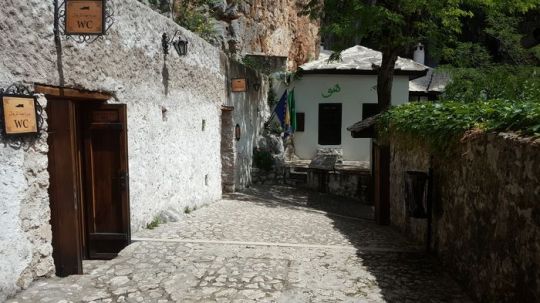
Konstantin Kostenechki
The great religious writers Grigorii Tsamblak, Konstantin Kostenechki, Cyprian and others developed under the direct influence of Patriarch Evtimi. After the Ottomans invaded Bulgaria they continued their useful activities abroad. Grigorii Tsamblak was elected bishop of Kiev and Cyprian became Metropolitan of Moscow. Konstantin Kostenechki emigrated to neighbouring Serbia where he wrote, among many other things, a biography of the Serbian King Stefan Lazarevic,
Parallel with the official literature, as at the time of the ‘Golden Age’, a rich apocryphal literature developed, written by unknown authors from among the people. The apocryphal works can be divided into two large groups – one dealing with economic and everyday life, and another one dealing with the eternal questions of the origin of the world and man. The most famous apocryphal works which have survived from the second group are ‘The Vision of Isaiah’, ‘Enoch’ and the ‘Sermon of the Three . Saints’.
The spirit of the Renaissance
The spirit of the Renaissance was felt not onLy in the apocryphal works and in some of the woiks of Patriarch Evtimi, but also in a considerable number of translated literary works on secular topics, such as. ‘The Fable of Troy’, ‘The Alexandria’ (about the life and exploits of Alexander the Great), ‘Physiologist’ (descriptions of various plants, animals and minerals), historical chronicles by the Byzantine authors George Hamartol (9th century), Zonara (12th century), Konstantin Manasses (12th cen-tury), local variants of pre-biblical legends, etc.
The remarkable upsurge of Bulgarian art and literature during the second half of the 14th century placed Bulgaria in the front ranks of the countries which were headed for the new times. This promising upsurge was, however, crudely nipped in the bud by an external factor – the last barbarian wave which flooded the European South-east in the 14th and 15th century – the onslaught of the Ottomans.
0 notes
Photo
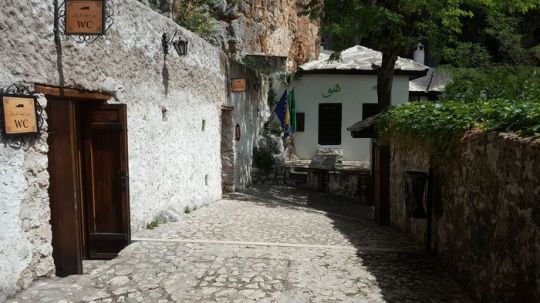
Konstantin Kostenechki
The great religious writers Grigorii Tsamblak, Konstantin Kostenechki, Cyprian and others developed under the direct influence of Patriarch Evtimi. After the Ottomans invaded Bulgaria they continued their useful activities abroad. Grigorii Tsamblak was elected bishop of Kiev and Cyprian became Metropolitan of Moscow. Konstantin Kostenechki emigrated to neighbouring Serbia where he wrote, among many other things, a biography of the Serbian King Stefan Lazarevic,
Parallel with the official literature, as at the time of the ‘Golden Age’, a rich apocryphal literature developed, written by unknown authors from among the people. The apocryphal works can be divided into two large groups – one dealing with economic and everyday life, and another one dealing with the eternal questions of the origin of the world and man. The most famous apocryphal works which have survived from the second group are ‘The Vision of Isaiah’, ‘Enoch’ and the ‘Sermon of the Three . Saints’.
The spirit of the Renaissance
The spirit of the Renaissance was felt not onLy in the apocryphal works and in some of the woiks of Patriarch Evtimi, but also in a considerable number of translated literary works on secular topics, such as. ‘The Fable of Troy’, ‘The Alexandria’ (about the life and exploits of Alexander the Great), ‘Physiologist’ (descriptions of various plants, animals and minerals), historical chronicles by the Byzantine authors George Hamartol (9th century), Zonara (12th century), Konstantin Manasses (12th cen-tury), local variants of pre-biblical legends, etc.
The remarkable upsurge of Bulgarian art and literature during the second half of the 14th century placed Bulgaria in the front ranks of the countries which were headed for the new times. This promising upsurge was, however, crudely nipped in the bud by an external factor – the last barbarian wave which flooded the European South-east in the 14th and 15th century – the onslaught of the Ottomans.
0 notes
Photo
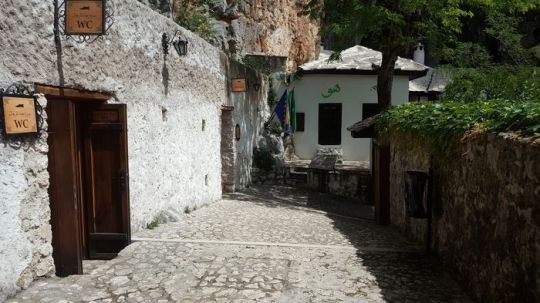
Konstantin Kostenechki
The great religious writers Grigorii Tsamblak, Konstantin Kostenechki, Cyprian and others developed under the direct influence of Patriarch Evtimi. After the Ottomans invaded Bulgaria they continued their useful activities abroad. Grigorii Tsamblak was elected bishop of Kiev and Cyprian became Metropolitan of Moscow. Konstantin Kostenechki emigrated to neighbouring Serbia where he wrote, among many other things, a biography of the Serbian King Stefan Lazarevic,
Parallel with the official literature, as at the time of the ‘Golden Age’, a rich apocryphal literature developed, written by unknown authors from among the people. The apocryphal works can be divided into two large groups – one dealing with economic and everyday life, and another one dealing with the eternal questions of the origin of the world and man. The most famous apocryphal works which have survived from the second group are ‘The Vision of Isaiah’, ‘Enoch’ and the ‘Sermon of the Three . Saints’.
The spirit of the Renaissance
The spirit of the Renaissance was felt not onLy in the apocryphal works and in some of the woiks of Patriarch Evtimi, but also in a considerable number of translated literary works on secular topics, such as. ‘The Fable of Troy’, ‘The Alexandria’ (about the life and exploits of Alexander the Great), ‘Physiologist’ (descriptions of various plants, animals and minerals), historical chronicles by the Byzantine authors George Hamartol (9th century), Zonara (12th century), Konstantin Manasses (12th cen-tury), local variants of pre-biblical legends, etc.
The remarkable upsurge of Bulgarian art and literature during the second half of the 14th century placed Bulgaria in the front ranks of the countries which were headed for the new times. This promising upsurge was, however, crudely nipped in the bud by an external factor – the last barbarian wave which flooded the European South-east in the 14th and 15th century – the onslaught of the Ottomans.
0 notes

